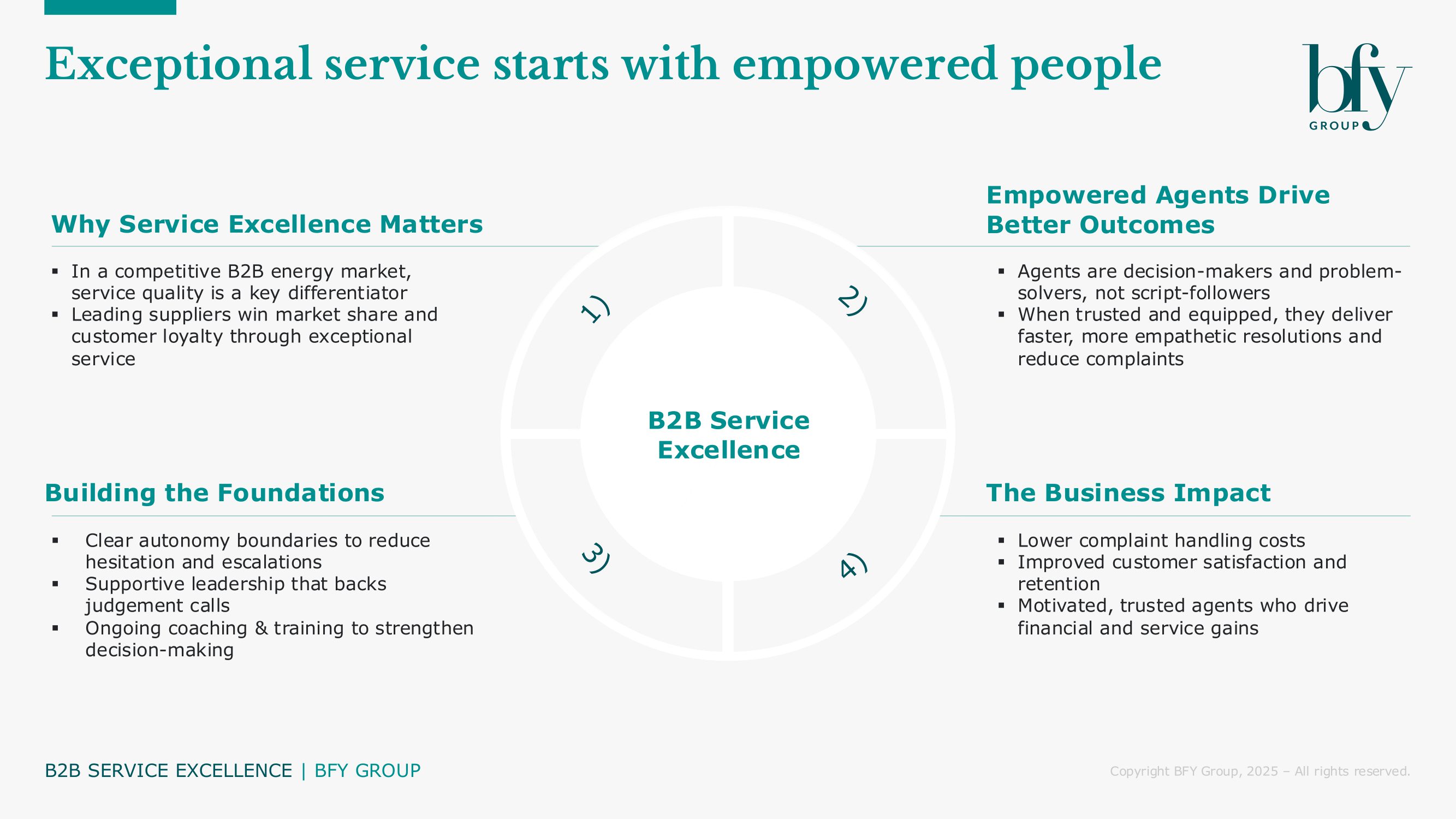In the B2B energy market, the difference between a transactional supplier and a valued partner comes down to one thing, the quality of the customer experience.
While some suppliers already set a high bar in their standards of service, others are on a journey to get there.
In today’s competitive market, the opportunity is huge, and service excellence is one of the few differentiators that customers genuinely notice and value. Some suppliers are already gaining significant market share based on service excellence alone - without having to resort to heavy price discounts.
Take one leading independent supplier. By extending support hours and upskilling its customer facing team, it became the no. 1 for customer service in early 2025. Today, it resolves 95% of its complaints within 8 weeks, proof that customer service investments pay off in both reputation and results.
And its not just customers who benefit. These improvements deliver measurable commercial value too. Even small service gains can drive significant financial impact for leadership teams.
About this series - B2B Service Excellence
This blog is the first in our series on Service Excellence in B2B Energy.
We’ll explore what it takes to create a customer service operation that isn’t just functional, but a true commercial differentiator.
Here’s what we’ll cover:
- Empowered Agents Drive Exceptional Service (this article)
- Integrated Offshore Teams Deliver High Value
- Great Service as a Commercial Lever, Not a Cost Centre
- How Customer Service Leaders Are Winning
Empowered agents drive exceptional service
The most consistent driver of exceptional service is a capable, confident frontline team.
Your agents are not only the voice of the business, but the decision-makers, problem-solvers, and emotional connection point for your customers. When they’re empowered to act with confidence, the benefits are immediate and tangible.
We’ve seen first-hand that when suppliers still rely on rigid scripts, they risk limiting agent autonomy, preventing natural, empathetic customer interactions. This often results in a transactional tone and a poor experience - what customers might perceive as “computer says no” or “agent doesn’t know how.”
Moving beyond rigid scripts
This isn’t about abandoning structure or quality. It’s about replacing rigid scripts with guided discretion.
Empowered agents resolve issues faster, with fewer handoffs, and in a way that feels more genuine. Instead of escalating unnecessarily, they:
- Actively listen
- Apply sound judgement
- Deliver outcomes that make customers feel heard and valued - not processed
An agent can’t simply be told they have authority. They must be equipped with the knowledge, tools, and trust to make smart decisions in real-time.

Building the foundations of empowerment
True empowerment means giving agents the confidence, clarity, and capability to consistently make the right decisions without hesitation or constant escalation. This involves:
- A true understanding of systems and policies: Not surface level knowledge, but a functional understanding of what policies mean in practice and how their actions influence commercial and customer outcomes.
- Clear boundaries for autonomy: Agents should know where to apply discretion and when escalation is necessary. When boundaries are vague, agents will default to caution – delaying customer resolution. Clarity around delegations of authority reduces the “fear of getting it wrong” and fosters confident ownership.
- Supportive leadership that backs their judgement: Empowerment will only work when reinforced by leaders who trust their teams. Agents need to know their decisions will be supported. When leaders routinely back judgement calls and use areas for improvement as coaching opportunities, it cultivates a culture of learning and trust.
- Ongoing coaching and training: Empowerment isn’t static. Continuous feedback and training keep agents sharp, engaged, and focused on improvement. Real time feedback and coaching can strengthen an agent’s ‘decision making muscle’ over time too.
Empowered agents feel trusted and invested, driving better performance, higher job satisfaction, and lower turnover - all essential for maintaining service quality at scale.
Case Study: Transforming a complaints department
When transforming the complaints department for a major energy supplier, we took a bold approach:
- Removing all system restrictions so agents could take full ownership of cases
- Granting significant financial delegated authority limits so most complaints could be resolved without managerial approval
- Upskilling agents to understand the commercial impact of their decisions, especially regarding repeat contacts and ex-gratia payments
By encouraging agents to think critically about both the customer experience and the business impact, they began making more balanced, informed decisions.
This shift led to:
- Faster, more empathetic resolutions, with agents resolving complaints on the spot rather than escalating unnecessarily
- A noticeable drop in repeat contacts and escalations, as agents focused on solving the root cause of issues the first time
- Reduced overall complaint handling costs, thanks to fewer touchpoints and a more streamlined process
- More motivated, trusted agents and happier customers, creating a positive cycle of improvement
Empowered to act decisively, agents not only improved customer outcomes but also drove measurable financial benefits for the business - proving that trust and capability go hand in hand.
What high-performing teams need
Exceptional service teams don’t just happen – they’re deliberately built.
The difference between average and outstanding performance often lies in agent leadership (rather than agent management, as many would default to), and their priorities shape frontline behaviours. High-performing teams are grounded in:
- Strong leadership that models pragmatic problem-solving. Team leaders set the tone. When they approach challenges with calm, confidence, and flexibility, agents are more likely to do the same
- Deep, scenario-based training. It’s not enough to teach agents how to navigate a system. Training must prepare them for the complexity of real-world customer situation – where emotion, policy and judgement all come into play. For example, if a customer calls about an unexpectedly high bill, an agent should go beyond resolving the billing query. This could mean empathising with the customer’s anxiety, explaining complex tariff structures in clear, simple terms, and using judgement to decide whether the issue stems from a potential meter error or requires escalation.
- KPIs aligned to customer outcomes. Metrics like first contact resolution are far more effective indicators of service quality than rigid compliant adherence to scripts or process steps. When performance is tied to outcomes that matter to the customer, service becomes more meaningful and effective
Case Study: Leadership Excellence in action
At one of the UK’s largest energy companies, we delivered a Leadership Excellence programme. Within just 2–3 weeks, there was a clear shift:
- Team leaders focused on meaningful coaching conversations rather than box-ticking
- Agent behaviours changed quickly, with improved problem-solving and empathy
The business saw measurable results:
- Higher customer satisfaction
- Fewer complaints
- Stronger team engagement
Empowered agents are the foundation of service excellence in the B2B energy market. By giving your frontline team the tools, trust, and authority to act, you create a customer experience that drives loyalty and commercial success.
As we continue this series, we’ll explore how offshore teams and data-driven strategies can amplify this impact - turning customer service into a powerful growth engine.
If you’d like to explore how to empower your agents, improve retention, and unlock measurable business value, contact Ian Barker or Hannah Sword.




